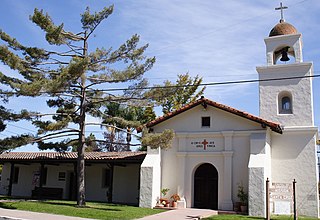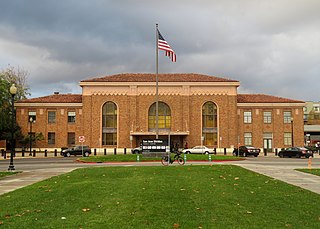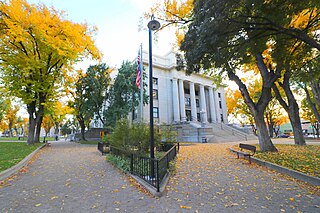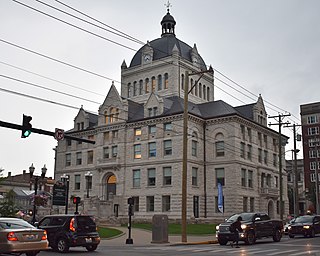
Mission Santa Cruz is a replica Spanish Californian mission in Santa Cruz, California. Located on the San Lorenzo River floodplain below what would later be named Mission Hill, the mission was founded on August 28, 1791, by Father Fermín Francisco de Lasuén, the successor to Father Junipero Serra. The mission was dedicated that same year but, in the winter rainy season, the river overflowed its banks and flooded the mission compound. The mission was then relocated to the top of Mission Hill.

Santa Cruz is the largest city and the county seat of Santa Cruz County, in Northern California. As of the 2020 census, the city population was 62,956. Situated on the northern edge of Monterey Bay, Santa Cruz is a popular tourist destination, owing to its beaches, surf culture, and historic landmarks.

Monterey State Historic Park is a historic state park in Monterey, California. It includes part or all of the Monterey Old Town Historic District, a historic district that includes 17 contributing buildings and was declared a National Historic Landmark in 1970. The grounds include California's first theatre, and the Monterey Custom House, where the American flag was first raised over California.

San Jose Diridon station is the central passenger rail depot for San Jose, California. It also serves as a major intermodal transit center for Santa Clara County and Silicon Valley. The station is named after former Santa Clara County Supervisor Rod Diridon Sr.

The Robert Waugh House, also known as the Sparland Octagonal House, is located in the Marshall County village of Sparland, Illinois, on a steep hillside overlooking the Illinois River. The house has been listed on the National Register of Historic Places since October 1978. The house was built by Robert Waugh, on land purchased for the sum of 25 dollars. It is the only site in Marshall County listed in the Register. It is a private residence and has "pie-shaped rooms around a central spiral staircase".

The Superior Court of California for and in the County of Santa Clara is the state trial court in and for Santa Clara County, California.

Downtown Santa Ana (DTSA), also called Downtown Orange County, is the city center of Santa Ana, the county seat of Orange County, California. It is the institutional center for the city of Santa Ana as well as Orange County, a retail and business hub.

The Old Orange County Courthouse, at one point also known as the Santa Ana County Courthouse, is a Romanesque Revival building that was opened in September 1901 and is located in Santa Ana's Historic Downtown District on Civic Center and Broadway streets. The Old Orange County Courthouse is officially recognized as California Historical Landmark No. 837 and is also on the National Register of Historic Places.

The T.G. Richards and Company Store, also known as Whatcom County Territorial Courthouse, is the first and oldest brick building in the state of Washington, United States, and is listed on the U.S. National Register of Historic Places.

The old Roane County Courthouse building in Kingston, Tennessee, the county seat of Roane County. Built in the 1850s, it is one of six remaining antebellum county courthouses in the state of Tennessee.

The Old Colony House, also known as Old State House or Newport Colony House, is located at the east end of Washington Square in the city of Newport, Rhode Island, United States. It is a brick Georgian-style building completed in 1741, and was the meeting place for the colonial legislature. From independence in 1776 to the early 20th century, the state legislature alternated its sessions between here and the Rhode Island State House in Providence.

The N. P. Smith Pioneer Hardware Store is a historic commercial building in Bend, Oregon, United States. The structure was built in 1909 by Nichols P. Smith, a Bend businessman. The two-story building originally housed a hardware business on the ground floor with family quarters on the second floor. The building is located on the Northwest Wall Street in downtown Bend. It has been in continuous use as a commercial building since it first opened. Today, the Smith Hardware Store is the only wood-frame structure that remains in downtown Bend. Because of its importance to the history of Bend, the Smith Pioneer Hardware Store is listed on the National Register of Historic Places.

The United States Courthouse, previously known as Institute Hall, Opera Hall, and Memorial Hall, is a building in Natchez, Mississippi that was initially constructed from 1851 to 1853, for use as an educational building. It has served a variety of public purposes in the intervening years. It was listed on the National Register of Historic Places in 1979. In 2007, it was rededicated as a courthouse of the United States District Court for the Southern District of Mississippi.

The San Bernardino County Court House, is a Classical Revival building located at 351 N. Arrowhead Ave. in San Bernardino, is the county courthouse for San Bernardino County, California. The courthouse was built in 1927 and has served as the center of county government since then. A 1937 welfare building, a 1940 county library, and a 1940 heating plant are also located on the courthouse grounds, which are extensively landscaped and include a fountain, sundial, plaque, and the remains of the former county courthouse.

The Cheshire County Courthouse, located at 12 Court Street in Keene, New Hampshire, is the center of government of Cheshire County, New Hampshire. Completed in 1859 to a design by Gridley James Fox Bryant, it is believed to be the oldest courthouse in regular use in the state. It was added to the National Register of Historic Places on December 13, 1978.

The Yavapai County Courthouse is located at 120 South Cortez Street in Prescott, Arizona. The current courthouse building was built in 1916. It was designed by architect William N. Bowman (1868–1944) and it was added to the National Register of Historic Places in 1977. It is also known for its statue of Bucky O'Neill, a Rough Rider and former Mayor of Prescott. Arizona Senator Barry Goldwater announced his presidential candidacy in 1964 from the steps of the courthouse.

The Courthouse Square Museum is a former government building, and current historical museum, located at 100 West Lawrence Avenue in Charlotte, Michigan. It was listed on the National Register of Historic Places in 1971.

The Superior Court of California, County of Santa Cruz, is the California superior court with jurisdiction over Santa Cruz County. It occupies two courthouses, one in Santa Cruz on Ocean Street and one in Watsonville on Second Street.

The Old Fayette County Courthouse (Kentucky) is a mixed-use commercial and civic office building located at 215 West Main Street in downtown Lexington, Kentucky, USA. It was originally built in 1898–1900 and designed by Cleveland-based architects Lehman & Schmitt, the fifth structure to be used as the Fayette County Courthouse. The building now contains civic offices, event spaces, and commercial retail space. It has been called the "most iconic building in Lexington."























